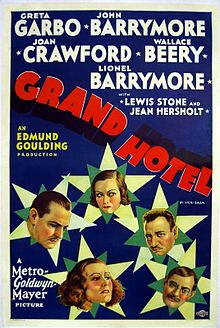Grand Hotel (1932 film)
| Grand Hotel | |
|---|---|

Original poster
|
|
| Directed by | Edmund Goulding |
| Produced by | Irving Thalberg |
| Written by | William A. Drake |
| Based on |
Grand Hotel (play) 1930 by William A. Drake and Menschen im Hotel 1929 by Vicki Baum |
| Starring |
Greta Garbo John Barrymore Joan Crawford Wallace Beery Lionel Barrymore Lewis Stone Jean Hersholt |
| Music by |
William Axt Charles Maxwell |
| Cinematography | William H. Daniels |
| Edited by | Blanche Sewell |
| Distributed by | Metro-Goldwyn-Mayer |
|
Release date
|
|
|
Running time
|
112 minutes |
| Country | United States |
| Language | English |
| Budget | $750,000 |
| Box office | $2,250,000 |
Grand Hotel is a 1932 American pre-Code Metro-Goldwyn-Mayer drama film directed by Edmund Goulding. The screenplay by William A. Drake is based on the 1930 play of the same title by Drake, who had adapted it from the 1929 novel Menschen im Hotel by Vicki Baum. To date, it is the only film to have won the Academy Award for Best Picture without being nominated in any other category.
The film was remade as Week-End at the Waldorf in 1945, and also served as the basis for the 1989 stage musical of the same title. Another remake, to be directed by Norman Jewison, was considered in 1977 which was to take place at Las Vegas' MGM Grand Hotel, but the project eventually fell through.
Grand Hotel has proven influential in the years since its original release. The line "I want to be alone", famously delivered by Greta Garbo, placed number 30 in AFI's 100 Years...100 Movie Quotes. Also, the phrase "Grand Hotel theme" has come to be used for any dramatic movie following the activities of various people in a large busy place, with some characters' lives overlapping in odd ways and some of them remaining unaware of one another's existence. Such "grand hotel" films have been set at airports, aboard ocean liners, in large department stores, etc., as well as in hotels. Neil Simon used the format in both play and film versions of Plaza Suite, California Suite, and London Suite. In 2007, the film was selected for preservation in the United States National Film Registry by the Library of Congress for being "culturally, historically, or aesthetically significant."
...
Wikipedia
